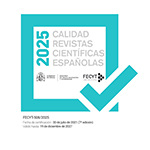Prácticas feministas en el cine documental español contemporáneo. Reflexiones a partir del análisis de La casa de mi padre (Francina Verdés, 2014) y Mater Amatísima (María Ruido, 2018)
Resumen
La popularización del macrogénero documental ha coincidido con la amplia presencia pública que los movimientos feministas han adquirido en los últimos años en España. En esta intersección, se han estrenado algunas películas de no ficción dirigidas por mujeres que exponen y denuncian las desigualdades de género mediante el uso de lenguajes creativos y rompedores para con la mirada heteropatriarcal del cine hegemónico. Este artículo se sitúa en el campo de estudio del documental feminista en España y se propone reflexionar sobre la capacidad del cine documental de tratar de manera radical la cuestión de la identidad de género a partir del análisis de La casa de mi padre (Francina Verdés, 2014) y Mater Amatísima (María Ruido, 2018). Se trata de dos piezas de tono subjetivista en las cuales sus directoras retoman legados feministas como la primera persona, las prácticas performativas y la empatía dialógica. A través de estas estrategias, cuestionan otra herencia: los procesos de mediatización en tanto prácticas de normalización de la desigualdad.
Descargas
Descarga artículo
Licencia
La revista Arte, Individuo y Sociedad, para fomentar el intercambio global del conocimiento, facilita el acceso sin restricciones a sus contenidos desde el momento de su publicación en la presente edición electrónica, y por eso es una revista de acceso abierto. Los originales publicados en esta revista son propiedad de la Universidad Complutense de Madrid y es obligatorio citar su procedencia en cualquier reproducción total o parcial. Todos los contenidos se distribuyen bajo una licencia de uso y distribución Creative Commons Reconocimiento 4.0 (CC BY 4.0). Esta circunstancia ha de hacerse constar expresamente de esta forma cuando sea necesario. Puede consultar la versión informativa y el texto legal de la licencia.










